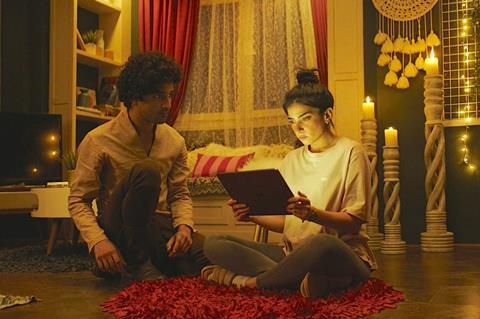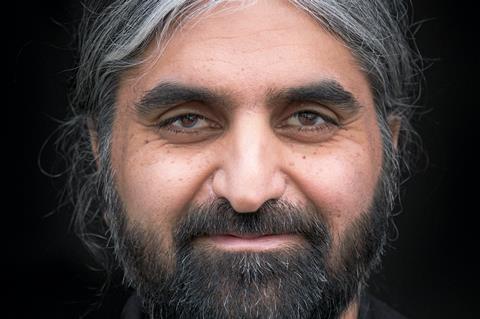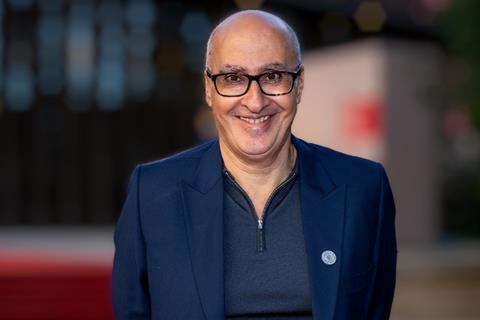
To get a sense of the range of films playing at this year’s Red Sea International Film Festival, take a look at the opening and closing films: Saudi romantic fantasy drama HWJN and Michael Mann’s turbocharged biopic Ferrari. These two very different features highlight how Red Sea not only throws a spotlight on cinema from the Middle East, North Africa and Asia (MENA), but also aims to screen talked-about international films for the first time in the Arab world.
This is done via multiple programming strands, including the Red Sea Competition, which focuses on innovative filmmaking and comprises 17 titles from Asia, Africa and the Arab world with a jury presided over by Baz Luhrmann. Among them are Amjad Al Rashid’s Cannes Critics’ Week title Inshallah A Boy, Mohamed Ben Attia’s Venice Horizons film Behind The Mountains and Saudi feature Mandoob, which debuted at Toronto.
The Arab Spectacular films, meanwhile, are aimed at attracting big Saudi audiences, often with well-known stars or popular stories. They include the world premieres of HWJN, Saudi director Abdulghani Alsaigh’s anticipated Yesterday After Tomorrow — about two brothers who find a portal to the past to contact their deceased father — and Faris Godus’s Fever Dream.
Elsewhere across the festival’s different sections, audiences can find buzzy titles from South Korea (Lee Jung-gon’s thriller series The Deal), Japan (Hayao Miyazaki’s The Boy And The Heron), India (Nikhil Nagesh Bhat’s martial-arts thriller Kill and Kiran Rao’s Lost Ladies), the US (Ava DuVernay’s Origin and Anna Kendrick’s Woman Of The Hour) and Europe (Léa Domenach’s Bernadette).

Reflecting on this year’s selection, Kaleem Aftab, director of international programmes, says it is more ambitious and expansive than its first two years: “We don’t want to just follow and be a European festival in the Middle East. We look at African films, Asian films but also understand how Korean, Bollywood, Iranian, Egyptian and Hollywood films are part of the cinema culture here. And then we are using those bases to expand people’s tastes [in Saudi] into other areas.”
Aftab says the festival has been easier to programme this year as a result of Red Sea’s growing international profile. The number of films submitted for consideration was far higher than anticipated too. “We had over 1,300 for the international strand,” says Aftab, adding that the calibre of directors who want to screen their films at Red Sea has also risen.
“It is testament to our success — people are starting to see how much coverage we get for our films,” he says, adding that the festival’s parallel events — such as the Red Sea Souk and talent initiatives — have made it “a more interesting festival to attend”.
Changing attitudes
Aftab also believes attitudes to Saudi Arabia have changed since the festival launched in 2021, not long after it ended a 35-year cinema ban as part of the country’s Vision 2030 plan to diversify its economy away from oil and transition towards a more moderate form of Islam. Back then, Aftab recalls many conversations with the international industry along the lines of, “Are women allowed into cinemas?”
Such conversations “have vanished”, he says. “People are aware that as a festival we are trying to be very ambitious in our programme — to test the limits and push the boundaries.”
Part of his pitch to potential festival titles is that Red Sea “is going to give you access to the biggest market in the Middle East”. Saudi is indeed the biggest MENA theatrical territory, with its 69 cinemas taking $87m in the third quarter of 2023, ahead of the UAE ($78m), Kuwait ($18m) and Lebanon ($11.8m), according to Saudi Film Commission figures. “I think people are interested in coming because they can see we are trying to open a market,” says Aftab.
This leads naturally to the question of what kind of films the festival is willing — and able — to programme. Saudi Arabia, after all, remains deeply conservative despite its moves to open to the world; it is still illegal to be LGBTQ+ in the country. Has the festival been able to programme the films it wants?
Aftab, a film writer and producer as well as programmer, says he has always been sensitive about programming for the festival, with his own upbringing giving him an understanding of what is and is not possible. “I grew up in England and I had Muslim parents,” he says. “There was always a dichotomy between what I knew was permissible at home and what I was enjoying outside.”
Nevertheless, it is clear he thinks Red Sea has helped push boundaries in terms of what audiences are allowed to watch in Saudi — and he believes other regional festivals have become more daring in their own programmes as a result. Aftab also points to a stronger focus this year on Red Sea’s family and children’s sections — “because there are a lot of films [in other sections] that are pushing the limits and we don’t want to alienate audiences.”
Given the conflict between Israel and Hamas, would the festival programme an Israeli film amid the passions sparked by the war? “We haven’t yet [but] it’s not out of the question,” says Aftab, who notes that Red Sea has programmed films from Iran despite the long history of rivalry between Saudi and Iran.
Reviewing this year’s international selection, Aftab thinks the festival has its strongest ever line-up of Asian films, including Ryusuke Hamaguchi’s Evil Does Not Exist and a new, shorter cut of South Korean director Kim Chang-hoon’s Cannes Directors’ Fortnight drama Hopeless (“a big improvement,” says Aftab).
It has been more challenging to programme African films. Aftab notes the Red Sea Film Fund has been investing in African filmmakers, and that he has travelled to Nigeria, Durban in South Africa and Burkina Faso over the past 18 months. “Great strides are being made, but we’re still struggling to find new and great African films.”
Coinciding with the rapid rise of the Saudi Pro League, the festival has also programmed a number of football-themed films. Red Sea hosts the MENA premiere of Rachel Ramsay and James Erskine’s documentary Copa 71, about the first Women’s World Cup in Mexico in 1971, and Kordo Doski’s Allihopa: The Dalkurd Story, about the remarkable success of a football team set up for young Kurdish refugees in a working-class Swedish town.
Arab premieres

Reflecting on the Arab titles in this year’s line-up, Antoine Khalife, director of Arab programmes and film classics, notes that eight Saudi films are playing in the Arab Spectacular section and another two in competition. Many are world premieres.
Should this be interpreted as a turning point for Saudi cinema? Khalife believes the quality of Saudi productions is improving. Last year, several Saudi films were submitted but few selected; many were also rejected this year too, but, Khalife adds: “I believe people are now taking their time to work on scripts, which are better than we experienced in the first two years of the festival.”
The professionalism of Saudi actors is also on the rise, he notes, singling out the young talent in Arab Spectacular film Yesterday After Tomorrow. Saudi films are also hiring technical crew from countries such as Tunisia, Egypt and Lebanon.
Last year, Red Sea was the launchpad for Saudi wrestling comedy Sattar, which has gone on to become one of the highest-grossing films at the Saudi box office. This year, Khalife lists HWJN and Mandoob as Saudi festival titles that are likely to have “a good career” in cinemas.
Mandoob, in particular, shows how Arab filmmakers are increasingly tackling sensitive themes and mirroring the realities of everyday life in the region. Ali Kalthami’s film centres on an overworked delivery app driver in Riyadh who branches out into delivering alcohol. “Can you imagine this, in a country where there is no alcohol!” says Khalife, also citing Tawfik Alzaidi’s Norah and Inshallah A Boy as examples of “Arab filmmakers wanting to tell stories about their values in their own way”.
Khalife says his selection has largely been unaffected by the events of the Israel-Hamas war. Most of the Arab film line-up needs to be locked by the end of August due to competition with other regional festivals for titles, including Marrakech, El Gouna and Cairo (although in the end, the latter two cancelled their 2023 editions).
Another unrelated challenge for Red Sea has been the SAG-AFTRA strike. On the surface, the end of the actors strike is good news but for a festival it means that talents who might have attended now have to go back to work. In other cases, talents who were reluctant to promote their films during the strike are now available. “It has been more of a juggling act [to arrange] this year,” confirms Aftab.
In many ways, these kinds of challenges are now part and parcel of organising film festivals in a post-Covid world. For Aftab, the biggest challenge is more existential. “During Covid, the main conversation was, ‘Will cinemas still exist?’ I think we’ve overcome that. But now the question for this industry is how we make people fall in love with cinema when there is so much entertainment choice. That’s the big battle that every film festival faces.”

























No comments yet